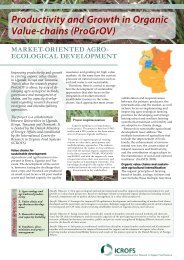The 2nd African Organic Conference â Mainstreaming ... - ICROFS
The 2nd African Organic Conference â Mainstreaming ... - ICROFS
The 2nd African Organic Conference â Mainstreaming ... - ICROFS
You also want an ePaper? Increase the reach of your titles
YUMPU automatically turns print PDFs into web optimized ePapers that Google loves.
2 nd AFRICAN ORGANIC CONFERENCE 2012<br />
May 2-4, 2012 in Lusaka, Zambia<br />
Current action taken on the weed. Because of the root volume and active growth, it is being used as a test<br />
crop for phytoremediation of polluted land in a Ph.D. project.<br />
Because Chickens peck the leaves it is being tried as chicken feed. It is being composted as organic<br />
fertilizer. <strong>The</strong> seed which is very hardy is being observed for survival after a season of<br />
incorporation in the soil and survival after composting. It is being tried for generation of biogas through<br />
anaerobic digestion. When incorporated as live mulch it sprouts. <strong>The</strong>refore, depth of incorporation in the<br />
soil is being studied for effective control of the weed as live mulch<br />
SURVEY&REPORT&ON&THE&WEED&<br />
A survey was carried out in northern part of Oyo State, Nigeria. <strong>The</strong> following observations were made:<br />
<strong>The</strong> Ladoke Akintola University of Technology organic lemon grass, tumeric and ginger farm under<br />
conversion was invaded by this noxious weed defying normal organic cultural weeding techniques. As a<br />
result, a survey team of NOAN members, ELOC Farm in Ghana, Mr James Cole, <strong>The</strong> NAPEP Director<br />
and Director of LAS <strong>Organic</strong> Farm visited Oyo north in the Northern Guinea savannah to evaluate the<br />
extent of invasion of the weed. Few pictures were taken.<br />
<strong>The</strong> following discoveries were made: Once a field was opened up, the weed took over and smouldered the<br />
cultivated crops. In a remote village in shaki local government area, an old woman (farmer) told us that the<br />
weed was first observed about 12 years ago in the dung of nomadic cattle. This zone is transition zone for<br />
pastoral nomads from the Sahel and Sudan savanna during the dry season.<br />
In 2011 when there was a long drawn dry spell, the weeds were wiped away for about four months after<br />
the onset of rain. This depicts the effect of climate change. <strong>The</strong> weeds have come back. <strong>The</strong>re are<br />
challenges:<br />
• An effective organic weeding strategy is yet to be advanced<br />
• <strong>The</strong> taxonomic classification is yet to be done.<br />
• <strong>African</strong> organic farmers should watch out for this weed invation<br />
CONVENTIONALIZATION&OF&THE&ORGANIC&SESAME&NETWORK&FROM&BURKINA:FASO:&<br />
PRIVATE&STANDARD&OR&STATE&FAILURE?&<br />
Corresponding author:<br />
LAURENT C. GLIN, FiBL West Africa and Environmental Policy Group/Wageningnen University, P.O Box<br />
8130, 6700 EW, Wageningen, <strong>The</strong> Netherlands.Email: Laurent.glin@wur.nl, glinlaurent@gmail.com ;<br />
Co-authors<br />
ARTHUR P.J. MOL, Environmental Policy Group, Department of Social Sciences, Wageningnen University,<br />
P.O Box 8130, 6700 EW, Wageningen, <strong>The</strong> Netherlands. Email: arthur.mol@wur.nl;<br />
PETER OOSTEVEER, Environmental Policy Group, Department of Social Sciences, Wageningnen University,<br />
P.O Box 8130, 6700 EW, Wageningen, <strong>The</strong> Netherlands. Email: peter.oosterveer@wur.nl.<br />
Abstract<br />
This research examines the structure and development of the organic sesame network from Burkina-Faso to<br />
explain the declining trend in organic sesame export. <strong>The</strong> paper addresses particularly the question whether<br />
the organic sesame network is structurally (re)shaped as a conventional mainstream market or whether it<br />
still presents a real alternative to the organization and governance of mainstream sesame production and<br />
trade. Combining an alternative food economy framework with the concept of ‘conventionalization’, this<br />
paper proves that the organic sesame is unable to offer a viable alternative to conventional trading, but is<br />
instead increasingly incorporated in the mainstream market channels. This case study also raises questions<br />
about the legitimacy and effectiveness of private and voluntary standards in governing alternative agrofood<br />
supply chains. We hypothesize that the organic standard, mainly driven and governed through private and<br />
BOOK OF ABSTRACTS 49





